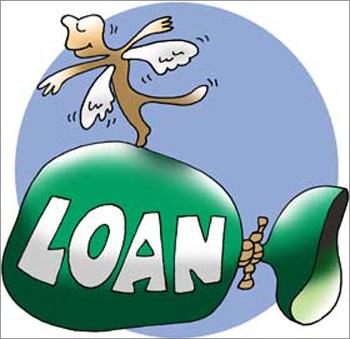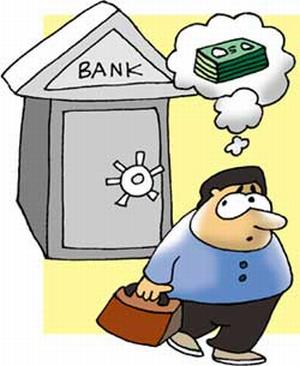 | « Back to article | Print this article |
Six personal loan truths that you MUST know!
Personal loan, being an easy line of credit, is often the loan seeker's first option.
Since the documentation required is little and the disbursement is faster, it automatically tops the list of anyone who is in need of emergency cash.
What may end up spoiling this party is the high interest rate that comes with this loan and ranges from 14 per cent to 24 per cent.
Here are six factors that can affect the interest rate offered to you.
Knowledge about the following criteria can also give you an edge while you negotiate the deal.
So click NEXT to read on . . .
Six personal loan truths that you MUST know!
1. Nature of Job
There was a time when banks believed salaried employees to be a better bet. But this perspective has largely changed after the spate of pink slips that were handed out in and after the financial crisis that started in the middle of September 2008.
So, now if you are on the payroll of a company then your job profile and the designation you boast of will play a major role. Banks generally have a grading system where they judge different corporates.
So if you are working with any of the big corporate houses then your chances of landing a better deal are higher.
This also means that it is likely that banks may offer you a higher rate of interest even if you are at a slightly better position at a lesser known company than someone who is a subordinate at a big corporate house.
Click NEXT to read on . . .
Six personal loan truths that you MUST know!
If your employer comes across as a fly-by-night-operator then you can even be denied a loan. But on the other hand if you approach the particular bank for a loan where you also have a salary account then you may land up a better deal with minimum documentation.
This will depend on the company that you work for and the duration of your work.
If you are a self-employed person then banks will take into account your balance sheet in the last two years. Apart from this you will be required to submit additional business-related documents, qualification proof, etc.
Click NEXT to read on . . .
Six personal loan truths that you MUST know!
2. Consistency and Stability
Factors that guarantee stability in a person's life are important determinants now.
This means that if you have a house of your then it adds to your stability quotient. Being married also gives you the edge.
And therefore you will be preferred over a bachelor who has been frequently shifting houses or cities. This is because banks generally will have to conduct more checks and will have to look for further references for bachelors.
Sticking to a job for long may also pay. Consistency in one's professional life is also emerging as an important determinant.
Click NEXT to read on . . .
Six personal loan truths that you MUST know!
Adhering to a job apart from providing stability to one's career also spells reliability in a person's attitude.
But on the contrary if you have already offered your services at four companies in the last 2 years that may make the banks cautious.
It will also require a more thorough background check.
Click NEXT to read on . . .
Six personal loan truths that you MUST know!
3. Location
Staying in an upscale posh location may help in more than just adding to the status quotient.
Banks are wary of offering this unsecured line of credit to smaller towns. Or if your town or area has a notorious image then banks may give you a miss.
Apart from this, the checks conducted by banks may also differ depending on where you stay.
This is true even for nearby locations in the same city. So if you are a Mumbai resident and you reside in Ghatkopar West then the due diligence may be different for you as compared to someone who stays in Worli.
Click NEXT to read on . . .
Six personal loan truths that you MUST know!
4. CIBIL record
If you haven't defaulted on any previous loan payments and boast of a good track record then you can negotiate a better deal.
CIBIL is an agency that keeps track of your previous credit record. A credit information report card helps in identifying a customer's credit history and warns the banks against an overleveraged customer.
A credit score of 900 is considered to be the best whereas 300 is on the other end of the spectrum.
A credit score below 500 is generally considered to be poor.
Click NEXT to read on . . .
Six personal loan truths that you MUST know!
Your credit report card helps the banks in differentiating good and bad track records.
On the other hand if you don't have a CIBIL record if you haven't taken a loan ever or don't have a credit card then banks will have to rely on an extensive background search.
This means that your waiting period for the loan may increase.
Click NEXT to read on . . .
Six personal loan truths that you MUST know!
5. Guarantor/Co-applicant
Banks generally don't ask for a guarantor for a personal loan. But if you are falling short on other parameters then the bank may ask you to substantiate your case by roping in a guarantor.
Make sure that your guarantor too has a good credit history else instead of helping your case it may work against you.
Or if it is a joint loan that you are applying for then despite the fact that you pass the bank's litmus test you may be offered a very high interest rate if your co-applicant doesn't stack up well against the eligibility profile.
So make your choose your co-applicant or guarantor carefully.
Click NEXT to read on . . .
Six personal loan truths that you MUST know!
6. Bank-Customer relationship
It is not mandatory for you to approach the same bank for a loan where you have an account, but if you do that it can mean less documentation and faster disbursal for you as the banks would have already taken the KYC (Know Your Customer) steps for you.
Also, if you are already servicing a loan from a particular bank and have a good repayment track record history to show then banks may waive off the processing fee which can be anywhere between 1-5% of the loan amount.
And yes, don't forget to haggle as with a good credit history you can land up a discount of anywhere from 25 basis points (one basis point is one hundredth of a percentage point) to 2 per cent on the interest rate.
So keep these factors in mind when you go loan shopping next time.
The author can be reached at shonalee.biswas@rediffmail.com









